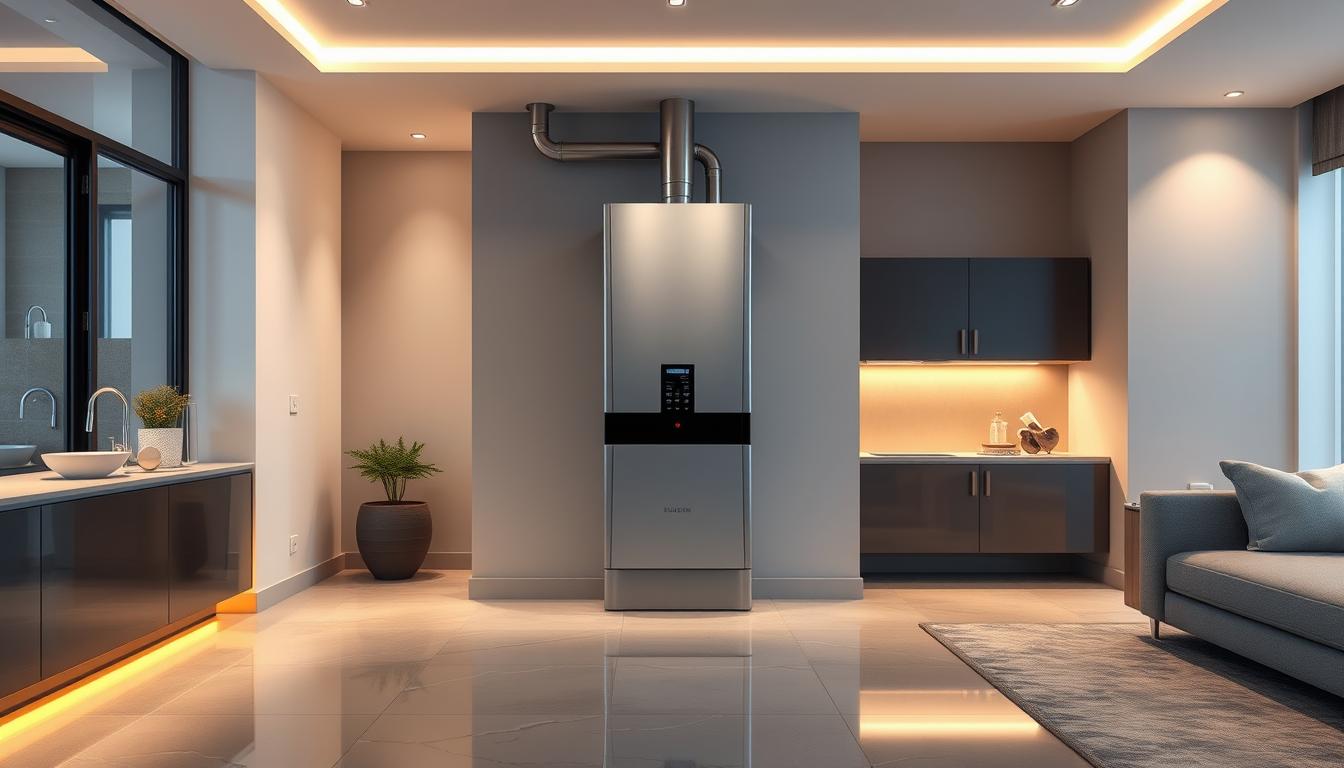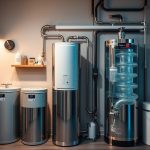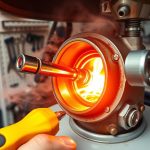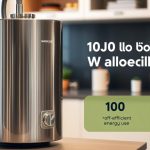Imagine never running out of hot water on a cold winter morning. Or never worrying about high energy bills. The right boiler hot water heater can make your home more comfortable and efficient. As energy costs go up, people are looking for smarter, cheaper ways to heat and get hot water.
Modern energy-efficient water heaters are changing home heating. These new boiler hot water heaters give you steady hot water and cut down on energy use. With the latest tech, you can stay cozy while saving on your bills.
Today’s homeowners care about the planet and their wallets. The right boiler hot water heater can save a lot of energy and work well all the time.
Key Takeaways
- Boiler hot water heaters can reduce energy consumption by up to 40%
- Modern systems offer continuous hot water with minimal energy waste
- Energy-efficient water heaters can significantly lower utility bills
- Advanced technologies provide both comfort and environmental benefits
- Professional installation ensures maximum system performance
Understanding Boiler Hot Water Heaters

Boiler hot water heaters are a top choice for heating homes today. They heat spaces and provide hot water. These systems have come a long way, thanks to standards set in 1915.
For those looking for a single heating solution, boiler hot water heaters are great. They manage temperature well, thanks to their design and engineering.
What Is a Boiler Hot Water Heater?
A boiler hot water heater does more than just heat water. It warms your home and provides hot water. This is more efficient than old water heaters.
- Generates heat for space warming
- Provides hot water for household use
- Operates using advanced thermal exchange technology
- Complies with ASME Boiler and Pressure Vessel Code standards
How Does It Work?
Installing a boiler hot water heater is a smart move. It heats water in a central boiler. Then, it sends warm water through your home.
| System Component | Function | Efficiency Rating |
|---|---|---|
| Central Boiler | Water Heating | 95-103% |
| Distribution Network | Heat Circulation | 80-90% |
| Safety Valves | Pressure Regulation | 100% |
“Modern boiler hot water heaters represent the pinnacle of home heating technology, combining efficiency with sophisticated design.” – HVAC Engineering Quarterly
Today’s condensing water heaters are super efficient. Some can reach up to 103% efficiency. This makes them a great choice for those who care about the environment.
Types of Boiler Hot Water Heaters
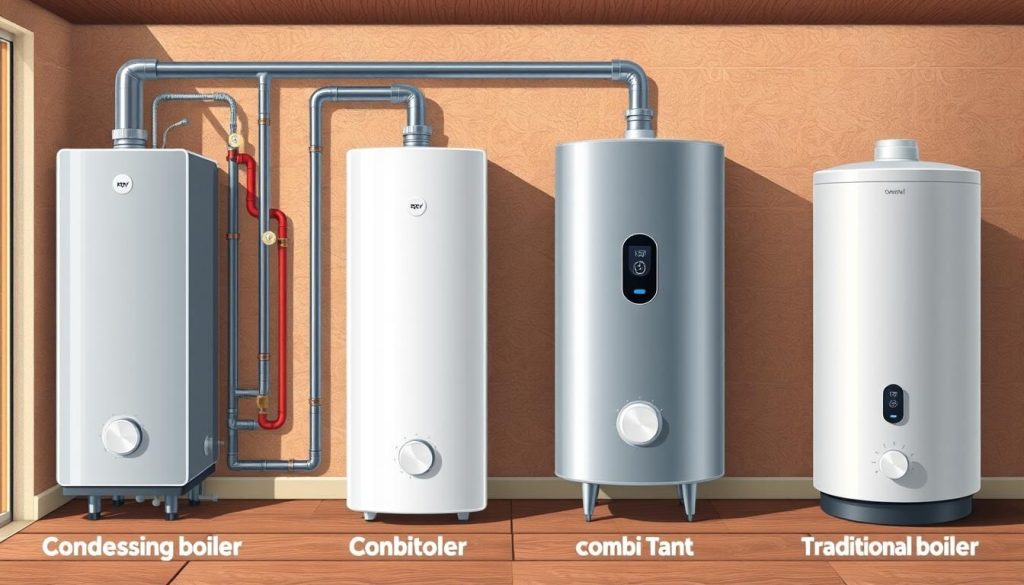
Homeowners have many choices when picking boiler hot water heaters. Knowing the different types helps make a smart choice for your home. From small gas water heaters to advanced tankless models, there’s a wide range for heating and water needs.
- Combi Boilers
- System Boilers
- Regular Boilers
Combi Boilers
Combination boilers are a modern choice for homes. They combine water heating and central heating in one unit. They heat water directly, so you don’t need separate tanks. Great for small spaces, they offer hot water on demand and efficient heating.
System Boilers
System boilers have a separate hot water tank. They’re good for homes needing more water. They connect to the main water supply and store heated water in a tank. Gas models in this category are popular for their steady performance and ability to serve many outlets at once.
Regular Boilers
Regular boilers need a cold water tank and a hot water cylinder. They might not be as compact as others, but they’re great for bigger homes. These heaters ensure hot water is available for all your bathrooms and fixtures.
| Boiler Type | Space Requirements | Hot Water Performance | Best Suited For |
|---|---|---|---|
| Combi Boilers | Compact | Instant | Small to Medium Homes |
| System Boilers | Medium | Stored | Medium to Large Homes |
| Regular Boilers | Large | Multiple Outlets | Large Homes, Complex Layouts |
Selecting the right boiler involves considering your home’s specific heating and water requirements.
Benefits of Using a Boiler Hot Water Heater

Homeowners looking for efficient heating are turning to boiler hot water heaters. These systems offer comfort, energy savings, and practical benefits. They are a step up from traditional heating methods.
Energy Efficiency that Saves Money
Energy-efficient water heaters are changing home heating. Boiler systems are top-notch for their performance and cost. Chicago homeowners love them for:
- Keeping heat for hours after turning off
- Lowering energy use
- Reducing monthly bills
- Lessening carbon footprint
“Boiler systems provide consistent warmth while maintaining superior energy efficiency.” – Home Heating Experts
Space-Saving Design
Modern homes need safe and compact heating solutions. Boiler hot water heaters are perfect for this. They save space compared to old heating systems.
Navien combi-boilers are a great example. They combine heating and hot water in one small unit. With a stainless steel heat exchanger, they offer unparalleled efficiency and save space.
Choosing an energy-efficient water heater means better performance, comfort, and practicality for your home.
Key Features to Look For

Choosing the right water heater is important. You need to think about several key factors. This helps homeowners make smart choices for installation and ensures the water heater works well and safely.
When looking at water heating options, there are a few important things to keep in mind:
Capacity and Size Requirements
The size of your water heater affects how much hot water you have. You should think about:
- How big your family is and how much hot water you use every day
- When you need the most hot water
- Where you can put the water heater
- What your household really needs
Energy Ratings and Efficiency
Being energy-efficient helps save money on bills. The government has rules now to make water heaters more efficient. Important things to look at are:
- ENERGY STAR certification
- Annual fuel utilization efficiency (AFUE)
- How much it will cost to run
- How much energy it uses
Heating water uses about 20% of what most families spend on bills, so saving energy is key.
Critical Safety Features
Safety is very important when you install a water heater. Important safety parts include:
- Temperature and pressure relief valves
- Automatic shut-off mechanisms
- Materials that won’t rust
- Insulation to keep it safe
By looking at these important features, homeowners can find a water heater that works well, saves energy, and keeps them safe.
Installation Process for Boiler Hot Water Heaters

Installing a boiler hot water heater needs careful planning and expertise. The process has many important steps. These steps can greatly affect your home’s heating efficiency and safety. Knowing about water heater installation helps homeowners make better choices for their heating systems.
Choosing the Right Location
Choosing the right spot for your water heater is key. The best spot is:
- Easy to get to for maintenance
- Close to gas and water lines
- Good ventilation
- Safe from very cold or hot temperatures
- Follows local building codes
Professional vs. DIY Installation
Water heater repair and installation need special skills. While DIY might save money, hiring a pro has big benefits:
| Professional Installation | DIY Installation |
|---|---|
| Guaranteed safety compliance | Potential code violations |
| Expert technical knowledge | Limited technical understanding |
| Warranty protection | Risk of voiding manufacturer warranty |
“Proper water heater installation is not just about connecting pipes—it’s about ensuring your home’s safety and efficiency.”
The cost of water heater installation is $3,000 to $4,000. Professionals usually need 6 to 8 hours. Skilled contractors make sure your system works well, reducing future repair needs.
For a successful installation, pick the right boiler, know local rules, and keep up with maintenance. Getting a pro to install it saves time, avoids dangers, and makes your system last longer.
Maintenance Tips for Longevity
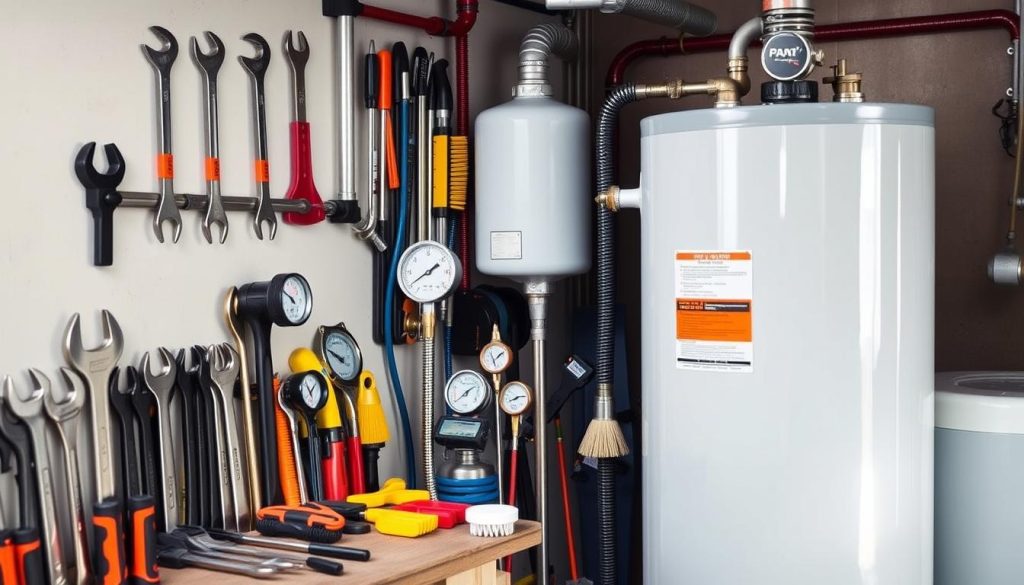
Keeping your water heater in good shape is key to its performance and life span. Regular care and checks can stop expensive repairs and keep your hot water flowing well.
Regular Professional Inspections
Getting your water heater checked once a year is a must. Experts say it’s vital to catch problems early. They suggest yearly checks to:
- Look for leaks and corrosion
- Test the pressure relief valves
- Check the electrical connections
- See how well the system is working
Systematic System Flushing
Buildup of sediment can hurt your water heater’s efficiency. Flushing it regularly removes these deposits and keeps it running smoothly. Experts advise draining about a quarter of the tank every few months to avoid sediment buildup.
“Routine maintenance can extend your water heater’s lifespan by several years and reduce energy consumption.”
Key Maintenance Strategies
- Replace the anode rod when the core wire is more than 6 inches exposed
- Keep the water temperature at 120 degrees Fahrenheit
- Insulate the tank and pipes to save heat
- Make sure there’s at least 2 feet of space around the unit
By following these maintenance tips, you can avoid sudden breakdowns, cut down on energy bills, and keep your hot water flowing.
Common Problems and Troubleshooting

Keeping your water heater in good shape is key to avoiding problems. Homeowners often face issues that need quick fixes or professional help.
Knowing about common water heater problems can help you fix them early. Most issues fall into two main categories: low water pressure and leaks.
Low Water Pressure Challenges
Low water pressure can really mess up your hot water. Several things can cause this:
- Sediment buildup in the tank
- Blocked pipes or valves
- Faulty pressure relief mechanisms
“Sediment buildup is the most common cause of water heater failure, affecting both performance and efficiency.”
Addressing Leakage Concerns
Leaks in water heaters need quick action. Check these areas first:
- Pressure valve connections
- Tank integrity
- Inlet and outlet pipe joints
Some leaks might just be condensation, which isn’t always a big deal. Regular maintenance can spot and stop leaks before they start.
When to Seek Professional Help
Some problems you can fix yourself, but others need a pro:
- Persistent tinted or foul-smelling water
- Complete lack of hot water
- Visible tank damage or extensive corrosion
- Unusual noises from the water heater
Regular upkeep can make your water heater last longer, usually eight to twelve years. Always check your warranty and get expert help for big repairs.
Comparing Boiler Hot Water Heaters with Other Systems
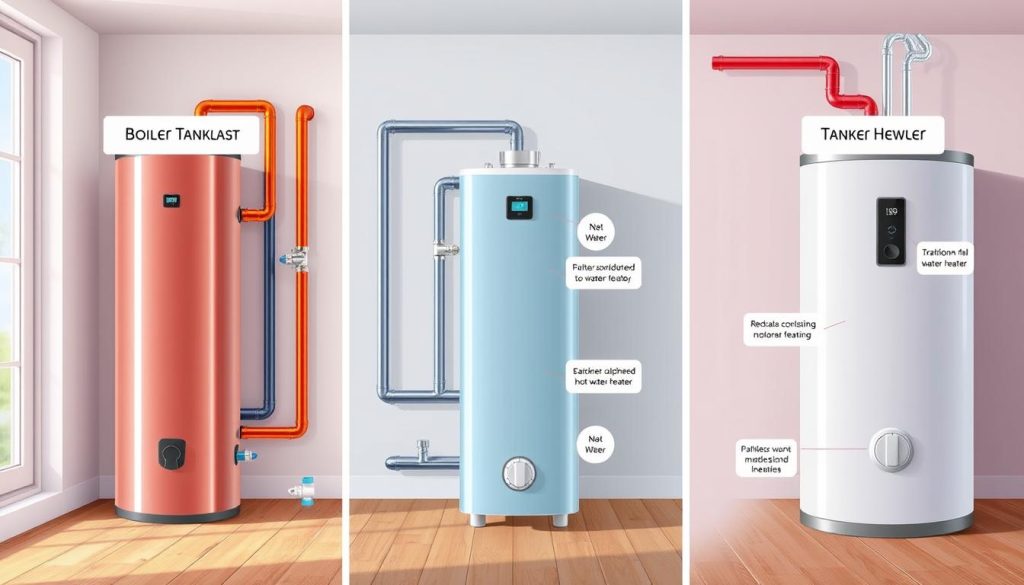
Choosing the right water heating system for your home is important. You have many options, including tankless, electric, and traditional boiler systems.
Home water heating has changed a lot. Different technologies offer their own benefits and drawbacks.
Tankless Water Heaters: On-Demand Efficiency
Tankless water heaters are a modern choice. They heat water only when you need it, saving energy compared to traditional tanks.
- Provide instant hot water
- Typically last up to 20 years
- Output between 2-5 gallons per minute
- More energy-efficient design
Traditional Storage Heaters: Reliable but Less Efficient
Traditional electric water heaters are common in homes. They keep hot water ready but use more energy than newer systems.
- Can hold 20-80 gallons of water
- Average lifespan of 6-15 years
- Lower upfront installation costs
- Potential for running out of hot water during peak usage
“The right water heating solution depends on your specific household needs, budget, and long-term energy efficiency goals.” – Home Heating Expert
When looking at these systems, think about costs, energy use, and upkeep. Tankless heaters cost $1,000 to $3,000 to install. Traditional systems cost $500 to $3,000.
| System Type | Average Lifespan | Installation Cost | Energy Efficiency |
|---|---|---|---|
| Tankless Water Heaters | 20 years | $1,000-$3,000 | High |
| Traditional Storage Heaters | 6-15 years | $500-$3,000 | Moderate |
The choice between tankless and traditional systems depends on your home, budget, and energy goals.
Energy Efficiency and Your Home

Water heaters use a lot of energy, making up nearly 20% of your home’s energy use. It’s important to choose energy-efficient water heaters for your home.
Today, people want to save money and help the planet. Installing a new water heater is a great way to make your home more energy-efficient.
Importance of Energy Star Ratings
ENERGY STAR certified water heaters are a big plus for homeowners:
- They use up to 4 times less energy than old models
- They cut energy use by 70%
- They can save you $550 a year
- They save you over $5,600 in your lifetime
“Choosing an energy-efficient water heater is good for the planet and your wallet.”
How to Calculate Efficiency
To figure out a water heater’s efficiency, look at a few important things:
- Energy Factor (EF) Rating
- Uniform Energy Factor (UEF)
- Annual Operating Costs
- Potential Rebates and Tax Credits
When picking a water heater, think about the total cost over time. Even though they might cost more upfront, they save you money in the long run.
Pro tip: Look for rebates from your local utility company on energy-efficient water heaters.
Cost Analysis of Boiler Hot Water Heaters
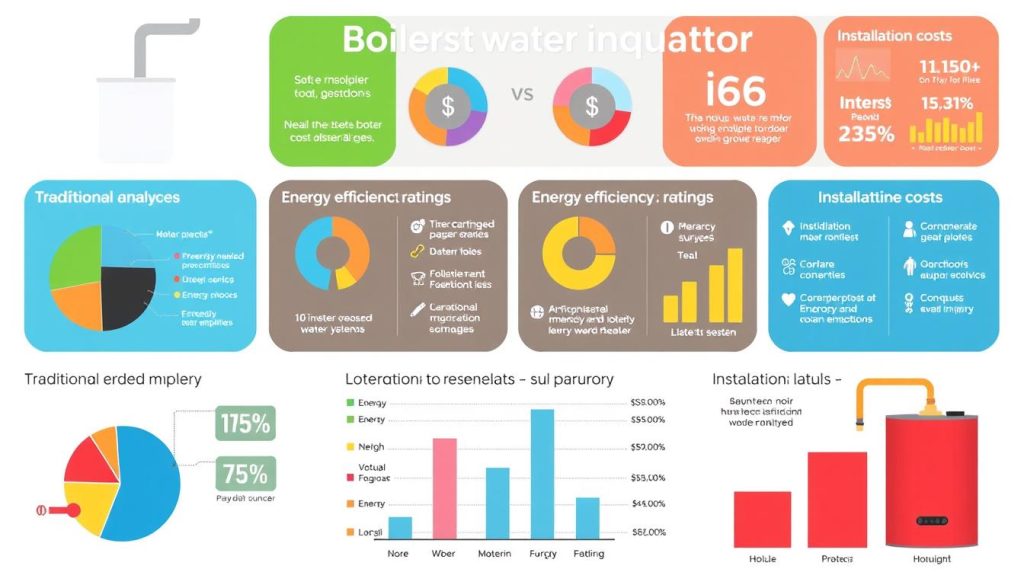
It’s important for homeowners to understand the costs of water heater installation and replacement. Choosing the right hot water system can greatly affect your energy bills and budget.
Initial Investment vs. Long-Term Savings
The cost of replacing a water heater might seem high at first. But, picking the right one can save you a lot of money in the long run. New water heater technologies use less energy, which means lower bills.
- Average water heater lifespan: 10 years
- Potential annual energy savings: Up to $300
- Energy consumption reduction: Up to 34% with advanced systems
Average Installation Costs
Installation costs for water heaters vary. You can expect to spend between $1,000 and $1,700 for a full electric system. This includes the equipment and the cost of professional installation.
| Water Heater Type | Equipment Cost | Installation Cost | Total Investment |
|---|---|---|---|
| Standard Electric | $300-$700 | $700-$1,000 | $1,000-$1,700 |
| Heat Pump System | $1,000+ | $700-$1,500 | $1,700-$2,500 |
Pro tip: Investing in energy-efficient water heaters can lead to significant long-term savings, often recovering the initial cost within three years.
Energy efficiency isn’t just about saving money—it’s about making smart, sustainable choices for your home.
Environmental Impact of Boiler Hot Water Heaters
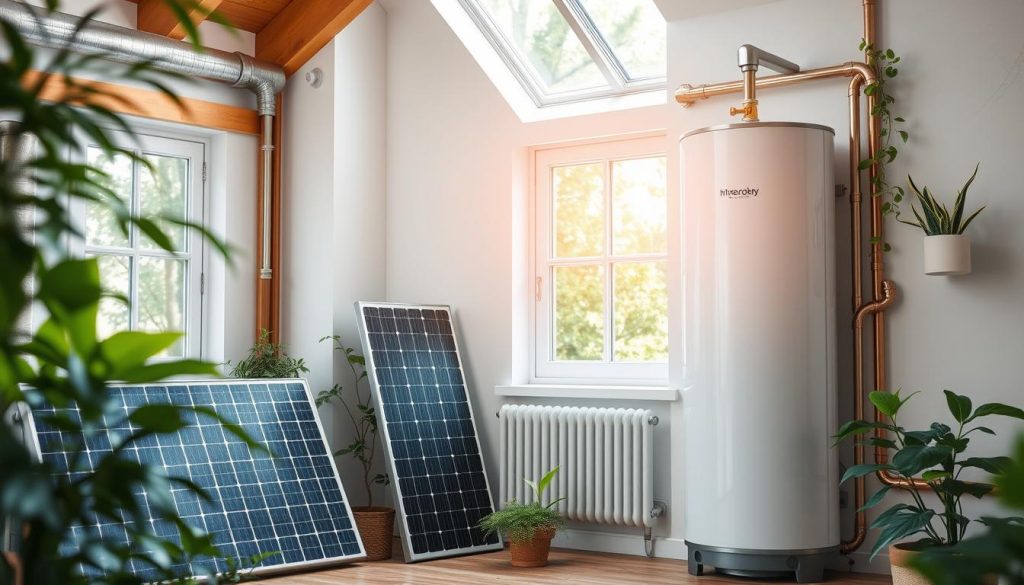
Water heating systems are key in how much energy we use at home and how green we are. Using energy-efficient water heaters is vital to cut down on carbon emissions and protect our planet.
Carbon Footprint Reduction Strategies
Gas boilers for heating and hot water can release about 2,200 kg of CO2 each year. Homeowners can lessen their environmental harm by smart water heating strategies.
- Choose energy-efficient water heaters with high Energy Star ratings
- Lower water heater temperature by 10° F to save 3-5% annual energy
- Implement water-saving techniques and insulation
Benefits of Renewable Energy Sources
Renewable energy technologies greatly improve water heater sustainability and environmental performance.
| Water Heating Technology | Energy Efficiency | Annual CO2 Reduction |
|---|---|---|
| Solar Water Heaters | Up to 50% cost reduction | Minimal direct emissions |
| Heat Pump Water Heaters | 70% less energy consumption | Significant emission reduction |
| Electric Tankless Heaters | 10% additional Energy Star savings | No direct greenhouse gas emissions |
Water heating systems represent a critical opportunity for homeowners to reduce environmental impact and achieve energy savings.
Water heater safety and energy efficiency are closely linked. By picking advanced technologies and smart usage, homes can cut their carbon footprint and keep hot water flowing well.
Renewable energy is the best way to make water heating green and save money in the long run.
Choosing a Reputable Brand
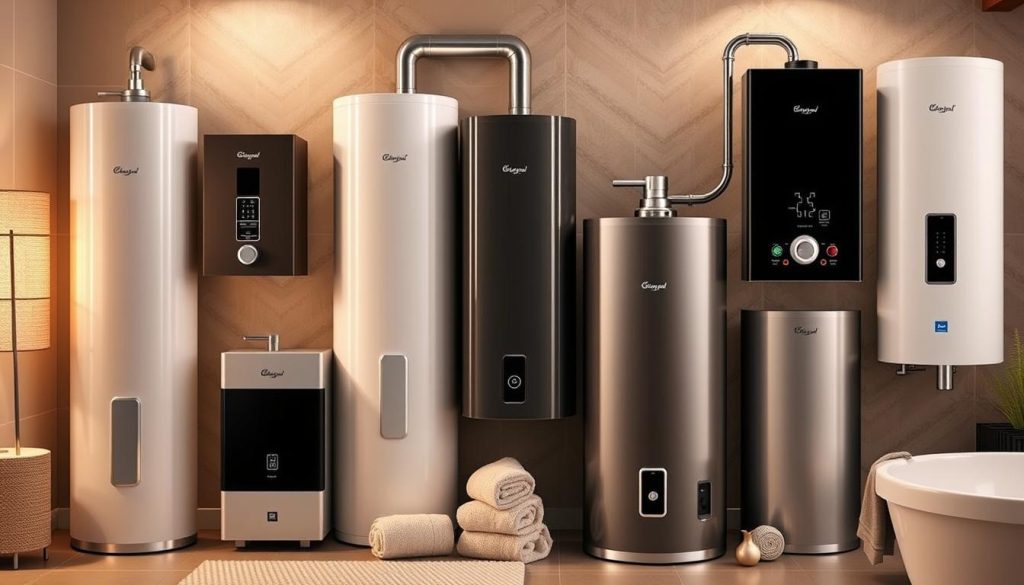
Choosing the right water heater brand is key for lasting performance and reliability at home. The market has many top brands known for quality, innovation, and customer happiness.
Top U.S. Water Heater Manufacturers
When looking to replace your water heater, several brands lead the way:
- Bradford White: An American brand from 1881, making both tank and tankless water heaters
- Rheem: Founded in 1925, offers a wide range of water heating solutions
- Navien: Known for its global reach and cutting-edge technology
- Kenmore: Provides hybrid water heaters with top efficiency
Comparative Analysis of Leading Brands
| Brand | Founded | Water Heater Types | Average Lifespan |
|---|---|---|---|
| Bradford White | 1881 | Tank, Tankless | 10-15 years |
| Rheem | 1925 | Tank, Tankless, Hybrid | 10-20 years |
| Navien | 1978 | Tankless, Hybrid | 15-20 years |
Customer Reviews and Ratings
Customer feedback is essential when picking a water heater. Look for brands with:
- Consistent positive ratings
- Strong warranty coverage
- Responsive customer support
- Availability of replacement parts
“Invest in a water heater from a reputable manufacturer to ensure reliability and long-term performance.”
Doing thorough research and knowing what each brand offers helps you choose wisely for your needs.
Local Regulations and Standards
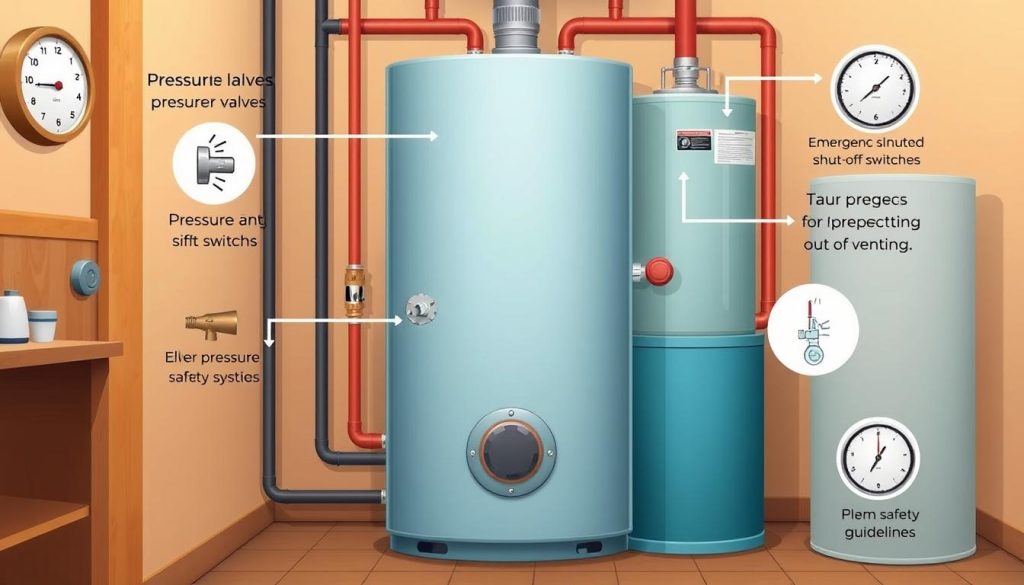
Understanding water heater safety and installation needs a deep grasp of local codes and regulations. Homeowners must see how important it is to follow these rules. This ensures your water heater works well and keeps you safe.
Installing a water heater comes with many rules to keep you and your home safe. These rules from local and national standards help your water heater run safely. They also lower the chance of any problems.
Critical Building Codes for Water Heater Installation
- Minimum clearance requirements around water heater units
- Specific venting and combustion air specifications
- Material standards for catch pans and protective equipment
Building codes give clear rules for water heater safety. For example, NFGC rules set specific clearances:
| Location | Minimum Clearance |
|---|---|
| Side and Rear | 4 inches |
| Front (Service Access) | 24 inches |
Safety Regulations and Mandatory Protections
Water heater safety rules cover many important parts of installation and use. Key safety standards include:
- Maximum temperature limit of 140°F to prevent scalding
- Mandatory drain valve specifications
- Emergency shutdown mechanisms for electrical and gas systems
Following local regulations is not just a suggestion—it’s a must for safe water heater installation.
Homeowners should talk to local building departments or water heater experts. This ensures they follow all safety standards. Knowing these rules protects your investment and makes sure your water heater works safely.
Upgrading Your Existing System
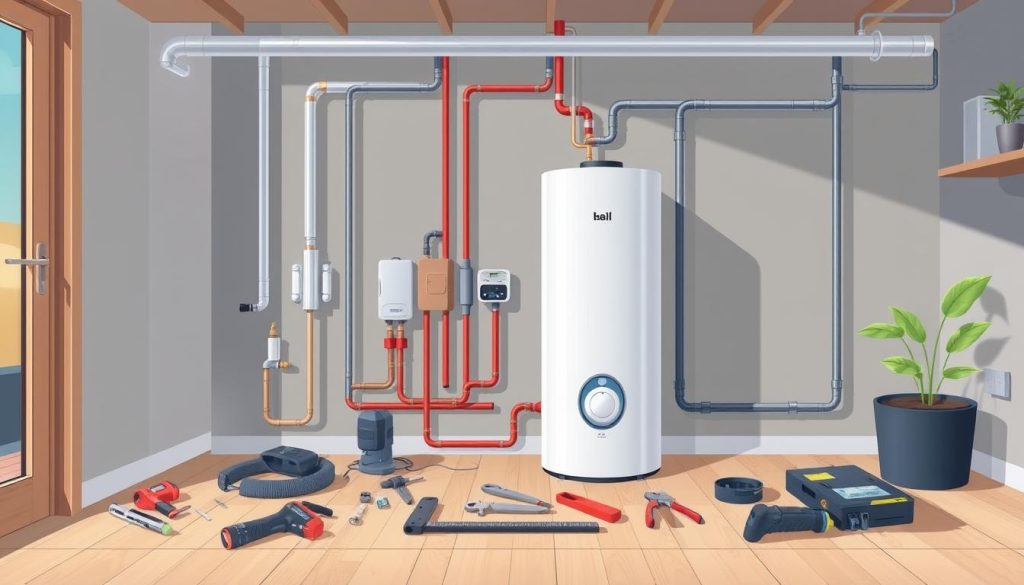
Replacing your water heater is a big decision for homeowners. It can make your home more energy-efficient and perform better. Knowing when and why to replace it can save you money and avoid system failures.
Figuring out when to replace your water heater involves looking at a few important things:
- System age (usually 10-15 years old)
- More repairs needed
- Less hot water than before
- Higher energy bills
Signs It’s Time to Upgrade
Energy-efficient water heaters are better than old ones. If your current water heater shows these signs, it’s time to think about getting a new one:
- Always getting cold water when you need hot
- Water is rust-colored or smells bad
- You hear loud popping or crackling sounds
- You see corrosion or leaks
Benefits of Upgrading
Choosing energy-efficient water heaters can change your home’s comfort and how much you spend on utilities. New systems offer big improvements:
| Upgrade Benefit | Potential Impact |
|---|---|
| Energy Savings | Could save up to 15% on energy |
| Performance | Always has hot water ready |
| Environmental Impact | Emits less greenhouse gases |
| Cost Efficiency | Could save about $250 a year |
“Upgrading your water heater isn’t an expense, it’s an investment in your home’s efficiency and comfort.” – Energy Efficiency Expert
Before you decide, talk to HVAC experts. They can check what you need and suggest the best energy-efficient water heaters for your home.
The Future of Boiler Hot Water Heaters
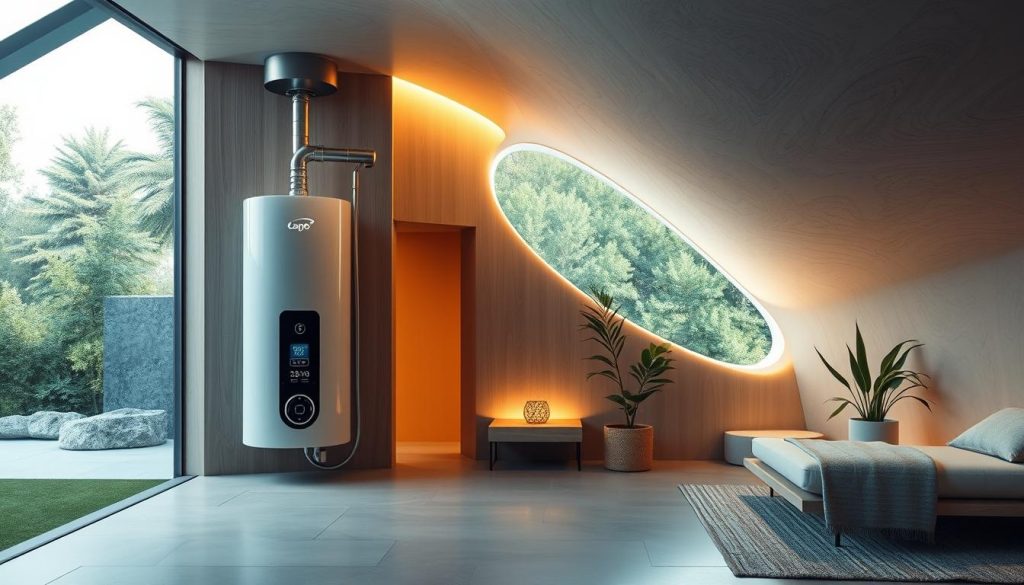
The world of energy-efficient water heaters is changing fast. New tech and green goals are leading the way. Homeowners and experts see big changes coming, like better efficiency, less energy use, and less harm to the planet.
New trends in water heater installation are changing our views on home energy. Key changes include:
- Smart control technologies for better performance
- Advanced heat pump water heating solutions
- Renewable energy integration
- Grid-interactive water heating systems
Technological Innovations Driving Change
The water heating world is seeing big tech leaps. Heat pump water heaters are becoming more popular. Companies like A. O. Smith see growing interest. These systems use air heat to warm water, saving a lot of energy.
| Technology | Energy Savings | Environmental Impact |
|---|---|---|
| Heat Pump Water Heaters | Up to 60% reduction | Significant CO2 emissions decrease |
| Grid-Interactive Systems | Potential $200 annual savings | Improved grid stability |
| Smart Control Technologies | 15-25% efficiency improvement | Reduced energy consumption |
Energy Efficiency Trends
Rules are making energy-efficient water heaters more common. Places like Washington and Denver are pushing for electric systems. This move is making homes more eco-friendly.
“The future of water heating is electric, smart, and sustainable.” – Energy Efficiency Expert
Installing water heaters is getting more advanced. Now, we see hybrid systems that mix old and new tech. They help cut down on carbon emissions without losing reliability.
Frequently Asked Questions
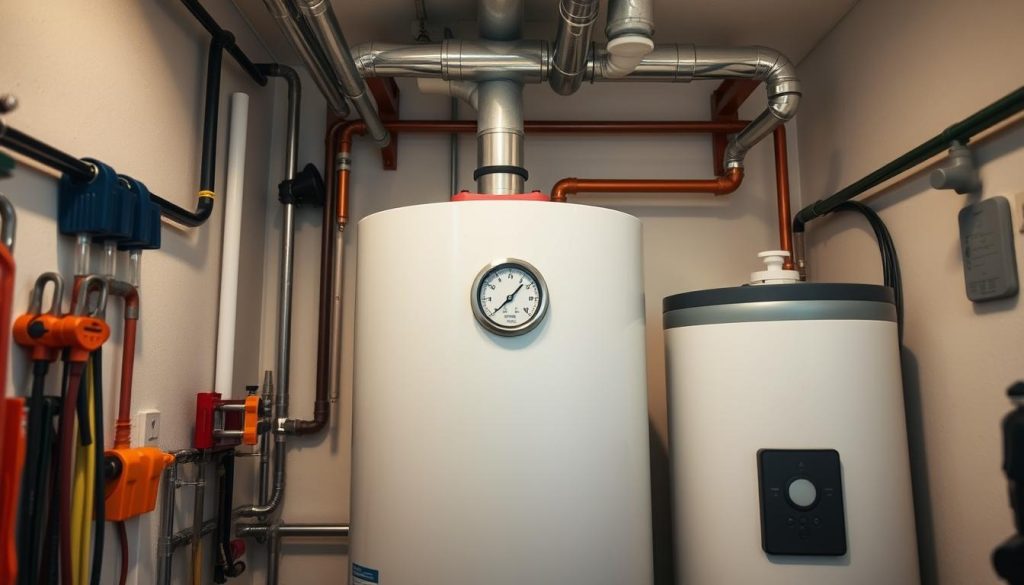
Homeowners often wonder about water heater maintenance and repair. Knowing how boiler hot water heaters work helps you make smart choices for your home’s heating.
Top Questions Homeowners Ask
- How long do boiler systems typically last?
- What are the key maintenance requirements?
- When should I consider replacing my boiler?
Lifespan and Maintenance Insights
Boilers usually last 15 to 20 years. It’s wise to have them checked every year. Regular maintenance can make your system last longer.
Inspection and Safety Considerations
| Inspection Type | Frequency | Purpose |
|---|---|---|
| High Pressure Boilers | Annual | Ensure safety and efficiency |
| Low Pressure Boilers | Every 2 Years | Prevent equipment failures |
| Pressure Vessels | Every 3 Years | Check structural integrity |
Best Resources for More Information
For advice, talk to professional contractors. The U.S. Department of Energy’s Energy Saver website and ENERGY STAR program have lots of info on boiler systems.
“Proper water heater maintenance is key to ensuring long-term efficiency and performance of your boiler system.”
Professional Assistance Recommendations
For water heater repair or complex maintenance, hire certified pros. DIY fixes can cause more problems and safety risks.
- Contact licensed boiler inspection professionals
- Schedule regular professional maintenance
- Keep detailed records of all inspections and repairs
Conclusion: Making the Right Choice
Choosing the right boiler hot water heater for your home is a big decision. Energy-efficient water heaters can cut down on your utility bills and keep your home warm. Getting help from professionals is key to finding the best heating solution.
When looking at boilers, think about how efficient they are, how much hot water they can make, and how well they’ll last. The best boiler hot water heater system is one that saves you money in the long run. Knowing how much hot water your family uses helps avoid getting a system that’s too big or too small.
While technical details are important, don’t forget about the practical stuff. Energy Star certified models are great because they save you money and help the planet. Working with licensed pros ensures your system is installed right, keeping your home comfortable and your investment safe.
Summary of Key Points
Remember, choose energy-efficient water heaters that fit your home’s size. Always get professional help and think about the long-term benefits of your boiler system. Keeping your system in good shape and making smart choices are key to getting the most out of your heating solution.
Final Recommendations
Do your homework, compare different models, and ask for expert advice to find the perfect boiler hot water heater for your home. Spending time on this can save you a lot of money and make your home more comfortable for years.
